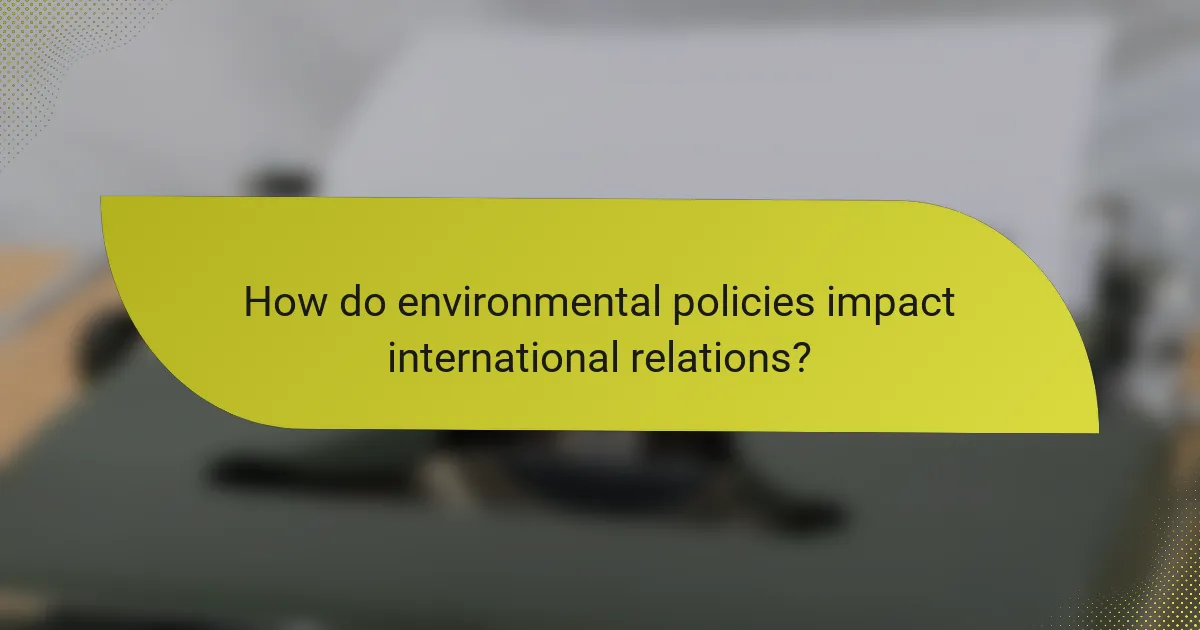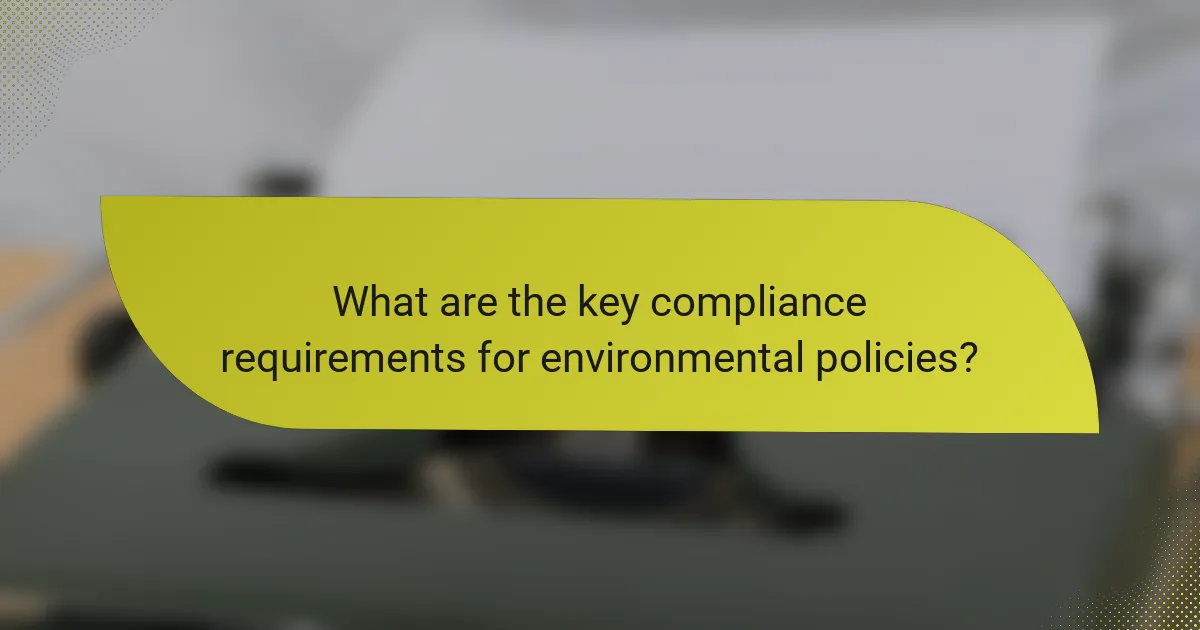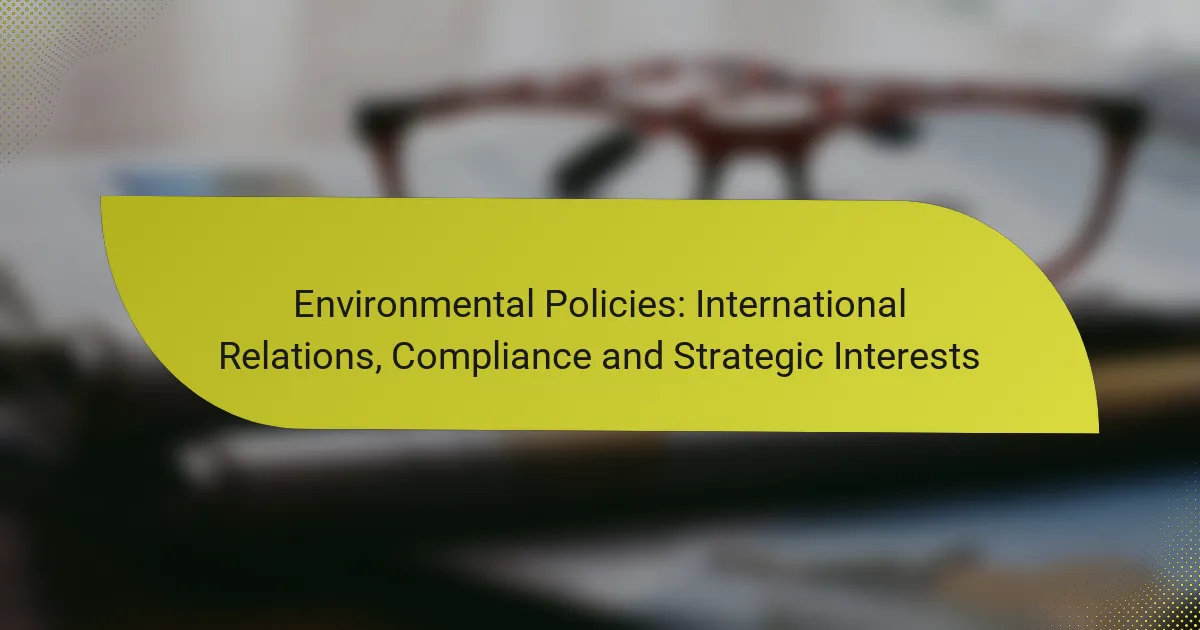Environmental policies play a crucial role in shaping international relations, influencing trade dynamics, diplomacy, and global governance. By aligning their environmental standards and commitments, nations can foster cooperation or create tensions, particularly regarding compliance and strategic interests.

How do environmental policies impact international relations?
Environmental policies significantly influence international relations by shaping trade, diplomacy, and global governance. Nations often align their environmental standards and commitments, which can enhance cooperation or lead to tensions based on compliance and strategic interests.
Influence on trade agreements
Environmental policies are increasingly integrated into trade agreements, affecting tariffs and market access. Countries may impose environmental standards that trading partners must meet, which can lead to preferential trade terms for compliant nations.
For instance, the European Union has established rigorous environmental regulations that impact imports, encouraging countries to adopt similar standards to maintain trade relations. This creates a competitive advantage for nations that prioritize sustainability.
Effect on diplomatic negotiations
Environmental policies play a crucial role in diplomatic negotiations, often serving as a platform for collaboration or conflict. Countries may leverage environmental commitments to strengthen alliances or to exert pressure during negotiations on other issues.
For example, climate change discussions at international summits can lead to broader agreements on security and economic cooperation, as nations recognize the interconnectedness of these challenges.
Role in global governance
Global governance frameworks increasingly incorporate environmental policies, influencing how countries collaborate on transnational issues. Organizations like the United Nations facilitate agreements that bind nations to specific environmental standards, promoting accountability.
These frameworks can enhance collective action on global challenges, such as climate change and biodiversity loss, by providing a structured approach to compliance and reporting among member states.
Case studies in international cooperation
Successful case studies illustrate the impact of environmental policies on international cooperation. The Paris Agreement is a prominent example, where countries committed to reducing greenhouse gas emissions, fostering collaboration across borders.
Another example is the Convention on Biological Diversity, which encourages nations to work together to protect ecosystems. These agreements demonstrate how shared environmental goals can lead to strengthened diplomatic ties and mutual benefits among participating countries.

What are the key compliance requirements for environmental policies?
Key compliance requirements for environmental policies include adherence to international treaties, national regulations, and specific reporting standards. Organizations must navigate these frameworks to ensure they meet legal obligations and contribute to sustainability goals.
International treaties and conventions
International treaties and conventions establish binding agreements among countries to address environmental issues. Examples include the Paris Agreement on climate change and the Convention on Biological Diversity. Compliance often requires countries to set and achieve specific targets, which can influence national policies and local regulations.
Organizations operating internationally must be aware of these treaties as they may impose obligations on member states, which can trickle down to businesses. Non-compliance can result in sanctions or loss of access to markets.
National regulations and frameworks
National regulations provide the legal framework for environmental compliance within a country. These laws can vary significantly, often reflecting local environmental priorities and challenges. For instance, the Clean Air Act in the United States sets standards for air quality that businesses must follow.
Companies should familiarize themselves with relevant national laws, as failure to comply can lead to fines, legal action, or reputational damage. Regularly reviewing updates to these regulations is crucial for ongoing compliance.
Reporting and monitoring obligations
Reporting and monitoring obligations require organizations to track and report their environmental impact regularly. This may include emissions data, waste management practices, and resource usage. Many jurisdictions mandate annual reports that detail compliance with environmental standards.
To ensure compliance, organizations should implement robust monitoring systems and maintain accurate records. This can help identify areas for improvement and demonstrate accountability to regulators and stakeholders. Regular audits can also aid in meeting these obligations effectively.

How do businesses align with environmental policies?
Businesses align with environmental policies by integrating sustainable practices into their operations, ensuring compliance with regulations, and actively participating in corporate social responsibility initiatives. This alignment not only helps them meet legal requirements but also enhances their reputation and competitiveness in the market.
Corporate social responsibility initiatives
Corporate social responsibility (CSR) initiatives are strategies that companies implement to contribute positively to society while minimizing their environmental impact. These initiatives often include community engagement, environmental conservation projects, and ethical labor practices.
For example, a company might sponsor local clean-up events or invest in renewable energy projects. By doing so, they not only fulfill regulatory expectations but also strengthen their brand loyalty among consumers who value sustainability.
Adoption of sustainable practices
Adopting sustainable practices involves integrating eco-friendly methods into daily operations. This can include reducing waste, optimizing resource use, and implementing energy-efficient technologies. Businesses may also seek certifications like ISO 14001 to demonstrate their commitment to environmental management.
Companies can start by conducting sustainability assessments to identify areas for improvement. Simple steps, such as switching to LED lighting or implementing recycling programs, can lead to significant reductions in their carbon footprint.
Partnerships with NGOs and governments
Forming partnerships with non-governmental organizations (NGOs) and government entities can enhance a business’s environmental initiatives. Collaborations can provide access to expertise, funding, and resources that facilitate the implementation of sustainable practices.
For instance, a business might partner with an NGO focused on biodiversity to develop conservation programs. Engaging with local governments can also help companies stay informed about regulations and potential incentives for sustainable practices, such as tax breaks or grants.

What strategic interests drive environmental policy decisions?
Strategic interests that drive environmental policy decisions include economic growth, national security, and public health. Countries often align their environmental policies with these interests to enhance their global standing, ensure resource availability, and protect their citizens’ well-being.
Economic benefits of sustainability
Sustainability initiatives can lead to significant economic benefits, such as job creation in green industries and cost savings through energy efficiency. For instance, investing in renewable energy sources like solar and wind can reduce dependency on imported fossil fuels, leading to lower energy costs over time.
Countries that prioritize sustainable practices often see increased foreign investment as businesses seek to align with environmentally responsible partners. This can enhance a nation’s economic resilience and foster innovation in sustainable technologies.
National security considerations
Environmental policies are closely linked to national security, as climate change can exacerbate resource scarcity and lead to geopolitical tensions. For example, competition for water resources in arid regions can trigger conflicts, making it essential for nations to adopt policies that promote sustainable water management.
Additionally, addressing environmental issues can mitigate risks associated with natural disasters, which are becoming more frequent due to climate change. By investing in infrastructure that can withstand extreme weather, countries can protect their populations and maintain stability.
Public health impacts
Environmental policies significantly influence public health by addressing pollution and promoting clean air and water. Reducing emissions from industrial sources and vehicles can lead to lower rates of respiratory diseases and other health issues, ultimately decreasing healthcare costs.
Furthermore, sustainable agricultural practices can improve food safety and nutrition, reducing the prevalence of foodborne illnesses. By prioritizing environmental health, governments can enhance the overall well-being of their citizens and create healthier communities.

How do emerging technologies influence environmental policies?
Emerging technologies significantly shape environmental policies by providing innovative solutions for sustainability and compliance. These advancements enable governments and organizations to address environmental challenges more effectively while aligning with strategic interests.
Role of renewable energy innovations
Renewable energy innovations play a crucial role in transforming environmental policies by reducing reliance on fossil fuels. Technologies such as solar panels, wind turbines, and bioenergy systems help countries meet their energy needs sustainably, often supported by government incentives and subsidies.
For instance, many nations have set ambitious targets for renewable energy adoption, aiming for a significant percentage of their energy mix to come from renewable sources within the next decade. This shift not only aids in reducing greenhouse gas emissions but also fosters energy independence.
Impact of data analytics on compliance
Data analytics enhances compliance with environmental regulations by enabling organizations to monitor their environmental impact in real-time. By leveraging big data, companies can track emissions, waste management, and resource usage, ensuring adherence to local and international standards.
For example, industries can use predictive analytics to identify potential compliance issues before they arise, allowing for proactive measures. This not only helps avoid penalties but also promotes a culture of sustainability within organizations.
Advancements in pollution control technologies
Advancements in pollution control technologies are vital for enforcing environmental policies aimed at reducing air and water pollution. Innovations such as carbon capture and storage (CCS) and advanced filtration systems help mitigate harmful emissions from industrial processes.
Governments often mandate the use of such technologies in specific sectors, incentivizing companies to invest in cleaner operations. By adopting these technologies, businesses can improve their environmental footprint while complying with stricter regulations and enhancing their public image.
